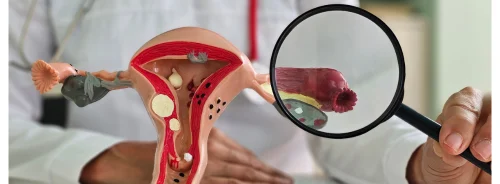Endometriosis, a chronic condition affecting over 1.5 million women and those assigned female at birth in the UK alone, remains underdiagnosed and underfunded despite its significant impact on lives. This disease, which can severely affect education, careers, relationships, fertility, and overall quality of life, is still unknown to many. With Endometriosis Action Month behind us, keeping the spotlight on this condition and its latest developments is essential. Recent reports highlight the concerning increase in diagnosis times, making it crucial to raise awareness and improve access to care. Fortunately, innovative solutions and emerging startups are leading the way to revolutionise endometriosis diagnosis.
Understanding Endometriosis
Endometriosis occurs when tissue similar to the endometrium, the womb's inner lining, grows in areas like the ovaries and fallopian tubes. This leads to chronic pain, a heightened risk of infertility, and even certain cancers. Despite its prevalence, endometriosis has long been overshadowed by other health conditions, receiving only a fraction of the funding allocated to diseases like diabetes. The average diagnosis time in the UK stands at eight years, a delay primarily due to non-specific symptoms and the difficulty in detecting endometriotic lesions through standard imaging methods. Traditionally, surgical procedures have been required to diagnose the condition definitively. However, the landscape is evolving as new non-invasive diagnostic technologies emerge, offering hope for quicker and more accurate diagnosis.
Innovative Startups Transforming Endometriosis Diagnosis
Several startups are at the forefront of developing groundbreaking diagnostic tools for endometriosis, leveraging the latest scientific research and technology. Dot Laboratories, Inc., a female-led company, has pioneered a blood test called DotEndo™ that detects endometriosis by analysing the expression of specific microRNAs. These RNA fragments are associated with the disease, and the company’s use of machine learning algorithms enhances the accuracy of the diagnosis. DotLab’s growing patent portfolio, including three granted US patents, ensures commercial protection for their innovative methods and strengthens their position in the market.
Another notable startup, French company Endodiag, is advancing the field with their blood test, EndoDTect®. This test focuses on identifying endometriotic cells through changes in biomarker expression, specifically targeting the CD71 receptor, which is present on all human cells and increases with cell proliferation. By binding to these receptors, anti-CD71 antibodies can detect endometriotic cells, offering a novel approach to diagnosis. Endodiag’s patents, including one granted in France and pending applications in other significant markets, protect their unique methods and pave the way for broader commercialisation.
In addition to blood tests, French company Ziwig has developed a saliva-based diagnostic device for endometriosis. Their product, Ziwig Endotest®, analyses 109 different salivary microRNAs using Next Generation Sequencing (NGS) and artificial intelligence. This innovative approach has been validated in one of the most extensive clinical trials for endometriosis, involving multiple specialist centres in France. Developing such non-invasive tests is a significant step forward in reducing diagnosis times and improving patient outcomes.
The Importance of Intellectual Property in Advancing Endometriosis Care
Intellectual property (IP) plays a vital role in protecting the innovations that drive advancements in endometriosis diagnosis. For startups, securing patents is essential to safeguard their core inventions from being exploited by competitors. Patents covering various aspects of a product, such as specific components, production methods, or usage techniques, add significant value to a company and can attract potential investors. The success of startups like DotLab, Endodiag, and Ziwig underscores the importance of a strong IP strategy in establishing market presence and enabling further research and development.
Filing patents provides commercial protection and ensures that companies can continue to innovate and bring their products to market without the threat of competitors undermining their efforts. For the field of endometriosis, where innovation has been stagnant for decades, the rise of startups with robust IP portfolios marks a crucial shift toward better care and treatment options for those affected by the disease.
Conclusion
As awareness of endometriosis continues to grow, so does the need for innovative solutions to address the challenges of diagnosis and treatment. Startups like DotLab, Endodiag, and Ziwig are leading the charge with their groundbreaking technologies, offering hope to millions of individuals living with this debilitating condition. Through their efforts and the strategic use of intellectual property, these companies are advancing the field of endometriosis care and contributing to the broader FemTech movement, empowering women to take control of their health and well-being. The future of endometriosis diagnosis looks promising, thanks to these innovative approaches and the ongoing commitment to improving patient outcomes.
Source: HealthTechDigital
Image Credit: iStock






